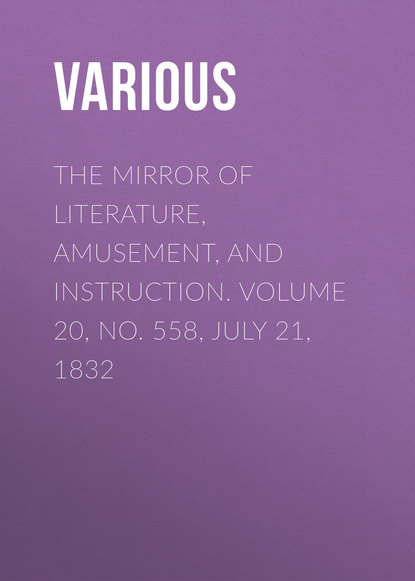 Полная версия
Полная версияThe Mirror of Literature, Amusement, and Instruction. Volume 20, No. 558, July 21, 1832
Bishop Ken.—This English prelate died as he was on a journey to Bath, in March, 1710, in the seventy-fourth year of his age. He had been in the habit of travelling many years with his shroud in his portmanteau, which he always put on when attacked by illness; of this he gave notice the day before his death, in order to prevent his body from being stripped. P.T.W.
Warning to Cowards.—There was a soldier that vaunted before Julius Caesar, of the hurts he had received in his face. Caesar knowing him to be but a coward, told him, "You had best heed next time you run away, how you look back."—Lord Bacon.
Love and Murder.—"Hipparchus, going to marry, consulted Philander upon the occasion; Philander represented his mistress in such strong colours, that the next morning he received a challenge, and before twelve he was run through the body."—Spectator.
Portugal.—Its ancient name was Lusitaenia. Its present name is derived from that of an ancient town called "Calle," on or near the site of the present Oporto, which was called "Portus Cale," or the Port of Cale; and in process of time the name of this port was extended to the whole country, whence "Portucal," or Portugal. Portus Cale was afterwards called "O Porto" (the harbour,) which name the town of Oporto ultimately received. P.T.W.
Perfection of Steam Navigation.—During the last four months, the Firebrand, steam-vessel from Falmouth, has traversed two voyages to Corfu, and one to Lisbon, a distance of 11,500 miles, which gives for the number of days, 66; she steamed, an average of 174 miles per day.
Sore Eyes and Wine.—It was a right answer of the physician to his patient that had sore eyes. "If you have more pleasure in the taste of wine than in the use of your sight, wine is good for you; but if the pleasure of seeing be greater to you than that of drinking, wine is naught."—Locke.
Chinese and Russian Cookery.—In China, if the cook employed in preparing the Imperial repasts, introduces any prohibited ingredients, even by inadvertence, he is punished with a hundred blows; if any of the dishes of food be not clean, he is liable to eighty blows; and if the cook omits to ascertain the quality of the dishes by tasting, he incurs fifty blows.
There cannot be a grand dinner in Russia without sterlet. In summer, when brought alive from Archangel, &c., these cost from five hundred to one thousand rubles each; a fish soup, made with champagne and other expensive wines, has been known to cost three thousand rubles; no water is allowed to enter into the composition of these expensive soups; and the whole company get very merry and talkative after partaking of them.
Honest Tar.—John Barth, the Dunkirk fisherman, rose by his courage and naval skill, to the rank of commodore of a squadron in the navy of France. When he was ennobled by Louis XIV. the king said to him, "John Barth, I have made you a commodore." John replied, "you have done right."
1
Copied, by permission, from a handsome Lithograph, published by Mr. Waller, Fleet-street.
2
The tower of the old church was furnished with a set of eight very excellent bells: there was also a bell of a smaller size suspended in one of the turrets, which was rung every morning at a quarter before seven o'clock. On the walls of the belfry were some records of exploits in ringing, which had been performed there on different occasions.
3
Blucher.
4
The day was so piercing that the king, at the persuasion of Bishop Juxon, wore a cloak till the moment of his death.
5
The late Sir Henry Englefield related a traditional anecdote, that Charles, in passing through the Park, pointed out a tree near the entrance from Spring Gardens (where the cows at present stand,) saying, "That tree was planted by brother Henry."
6
See the evidence on the trials of Hacker, Axtell, and Hulet, State Trials, vol. v.
7
It being doubted whether the king would submit to the executioner, staples were driven into the block, and hooks prepared, in order, if necessary, to confine his head forcibly to the block. On the trial of Hugh Peters in 1660, it was sworn that this was done by his orders given on the scaffold to one Tench, a joiner; in Houndsditch. See State Trials, vol. v.
8
There is, I am informed, a tradition in Westminster School, that South, the celebrated divine, was the boy whose turn it was to read prayers on the day of Charles's death; and that he read the prayer for the king as usual. South at that time must have been about fourteen years of age. Five years afterwards, when the loyal and learned divine was at Christ Church, Oxford, we find his name to a copy of Latin verses, addressed to the Protector on his conclusion of a treaty with the States of Holland. This, no doubt, was a mere college exercise. See Musae Oxoniensies, 1654.



